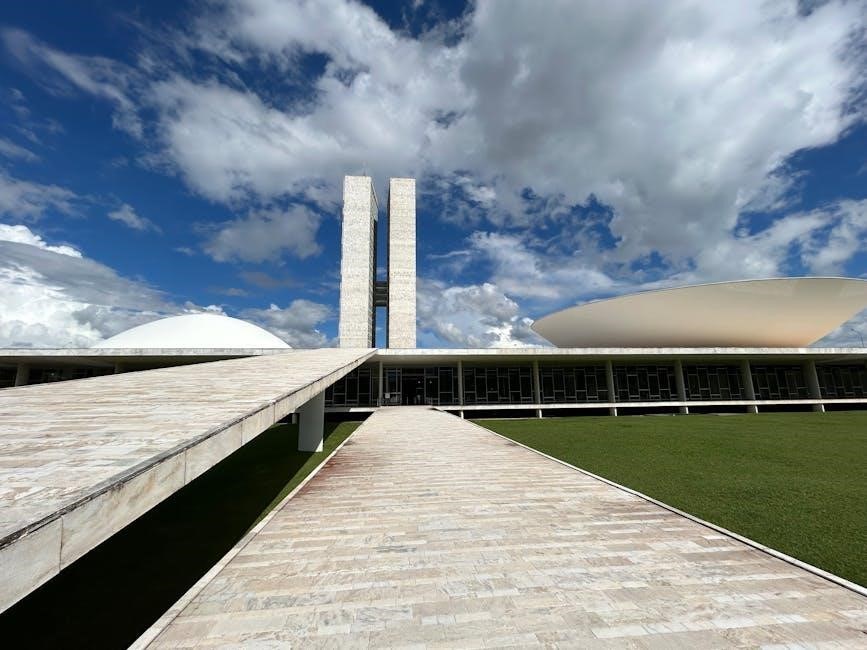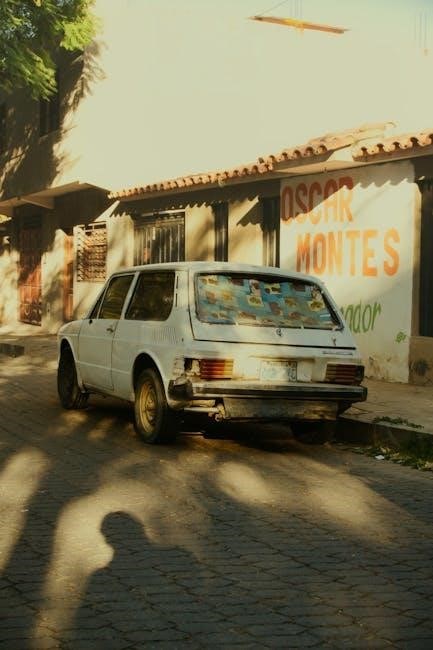Junot Díaz’s Pulitzer-winning novel, The Brief Wondrous Life of Oscar Wao, explores identity, culture, and family curses through vibrant storytelling and unique linguistic styles, captivating readers worldwide.
Overview of the Novel
The Brief Wondrous Life of Oscar Wao is a Pulitzer Prize-winning novel by Junot Díaz, blending vibrant storytelling with a unique linguistic style. The book follows Oscar, a Dominican-American youth, as he navigates identity, culture, and family history. Set against the backdrop of the Dominican Republic under Rafael Trujillo’s dictatorship and the diaspora to New Jersey, the novel explores themes of identity, trauma, and belonging. Díaz’s use of Spanish slang, sci-fi references, and magic realism creates a captivating narrative that spans generations, weaving together personal and historical struggles.
Author Junot Díaz and His Background
Junot Díaz, a Dominican-American writer, was born in Santo Domingo and immigrated to New Jersey as a child. His experiences as an immigrant deeply influenced his work, blending Caribbean culture with American life. Díaz’s unique voice combines street slang, sci-fi references, and traditional Dominican storytelling. A professor at MIT, he gained acclaim for his short stories before publishing Oscar Wao, which earned him the Pulitzer Prize. His work explores identity, diaspora, and the struggles of belonging, resonating with readers worldwide.
The Significance of the Title “Oscar Wao”
The title The Brief Wondrous Life of Oscar Wao reflects the novel’s exploration of identity and cultural heritage. “Oscar Wao” blends Oscar’s name with a Dominican slang term, symbolizing his dual identity as both Dominican and American. The title also hints at the tragic yet extraordinary journey of the protagonist, encapsulating themes of family curses, cultural displacement, and the search for belonging. It captures the essence of a life marked by both wonder and struggle, resonating deeply with the Dominican diaspora experience.

Plot Summary
The novel traces Oscar’s struggles with identity, family curses, and cultural displacement, blending Dominican history under Trujillo with his journey as a sci-fi loving, awkward teen in America.
The Prologue: Introducing the Curse
The prologue, narrated by Yunior, introduces the curse that haunts Oscar’s family, tracing its origins to the Dominican Republic under Rafael Trujillo’s brutal regime. Yunior’s voice blends Spanish slang and sci-fi references, setting the tone for a story that intertwines family history, cultural identity, and fantasy. The curse, known as fukú, is portrayed as an inescapable force shaping the lives of Oscar and his ancestors. This opening chapter establishes the novel’s unique narrative style and hints at the tragic destiny awaiting its protagonist.
Oscar’s Childhood in New Jersey

Oscar’s childhood in Paterson, New Jersey, is marked by his struggles to fit into the Dominican-American community. As a self-proclaimed nerd, he finds solace in science fiction and fantasy, setting him apart from his peers. His early confidence with girls fades as he grows older, leading to feelings of isolation. Yunior’s narrative captures Oscar’s unique voice and the cultural tensions he faces, highlighting his journey as an outsider navigating identity and belonging in a world that often misunderstands him.
The Struggles of a Dominican-American Teen
Oscar’s teenage years are defined by his struggle to reconcile his Dominican heritage with his American upbringing. His early confidence with girls fades, leaving him isolated and insecure. As a self-described nerd, his love for science fiction and fantasy further sets him apart from his peers. Yunior’s narrative captures Oscar’s identity crisis, highlighting his desire to belong while navigating the expectations of masculinity and culture. His journey reflects the broader challenges of growing up between two worlds, where tradition and modernity collide.
The Multigenerational Family Saga
The novel unfolds as a sweeping family saga, tracing the curse that haunts Oscar’s ancestors. From his grandfather Abelard’s struggles under Trujillo’s regime to his mother Beli’s resilience, the story weaves together generations of love, loss, and survival. La Inca, the matriarch, embodies the strength and wisdom passed down through the family. The narrative seamlessly connects the past in the Dominican Republic with the present in the United States, illustrating how historical trauma shapes individual and collective identity. This intergenerational tapestry forms the heart of Oscar’s journey, linking his struggles to those of his forebears.
Major Themes
Identity, belonging, family history, trauma, culture, diaspora, love, sex, and masculinity are central themes, each intricately woven into the narrative.
Identity and Belonging
Oscar’s struggle to reconcile his Dominican heritage with his American upbringing defines his quest for identity. As a Dominican-American, he feels displaced in both cultures, grappling with societal expectations and personal insecurities. His family’s history, marked by migration and cultural shifts, amplifies his sense of alienation. The novel vividly portrays the challenges of belonging in a diasporic community, where traditions clash with modernity, leaving Oscar caught between two worlds, searching for acceptance and self-definition.
The Weight of Family History and Trauma
The novel delves into the intergenerational trauma haunting Oscar’s family, rooted in the Dominican Republic’s turbulent past under Rafael Trujillo. The curse, or fukú, symbolizes the lingering effects of violence and oppression. Oscar’s struggles are deeply intertwined with his family’s history, as the ghosts of his ancestors’ suffering shape his destiny. The trauma of exile, dictatorship, and personal loss weighs heavily, illustrating how the past reverberates through the present, influencing Oscar’s identity and fate. This legacy of pain underscores the novel’s exploration of resilience and inherited sorrow.
Culture and Diaspora
The Brief Wondrous Life of Oscar Wao vividly portrays the Dominican-American experience, blending traditional culture with modern diasporic life. The novel highlights the struggles of maintaining identity amidst cultural displacement, as characters navigate the clash between their Caribbean heritage and American surroundings. Díaz’s use of Spanish slang, sci-fi references, and folklore creates a unique narrative voice, bridging the gap between the old world and the new. This duality reflects the broader immigrant experience, where cultural roots and adaptation intertwine, shaping a vibrant yet complex sense of belonging. The novel underscores the resilience of diasporic communities in preserving their heritage while forging new identities.
Love, Sex, and Masculinity
In The Brief Wondrous Life of Oscar Wao, love and sex are intertwined with identity and cultural expectations. Oscar’s struggles with relationships contrast sharply with the hyper-masculine ideals of his Dominican heritage, epitomized by figures like Porfirio Rubirosa. The novel critiques toxic masculinity while exploring the vulnerabilities of its male characters. Love becomes both a source of hope and a burden, as the characters navigate desire, heartbreak, and the weight of family history. Díaz’s portrayal of masculinity is complex, blending humor, tenderness, and a sharp critique of traditional gender roles.

Key Characters
The novel centers around Oscar de León, a Dominican-American teen struggling with identity and family curses. Yunior, the narrator, shares his insights, while Abelard, Beli, and La Inca represent the complex family dynamics.
Oscar de León: The Protagonist
Oscar de León is the heart of the novel, a Dominican-American teen grappling with identity, family curses, and societal expectations. His struggles to fit in and find love highlight his uniqueness as an outcast. Unlike the stereotypical Dominican “players,” Oscar finds solace in science fiction and fantasy, showcasing his quirky, intellectual side. His journey from childhood in New Jersey to adulthood is marked by both humor and tragedy, making him a deeply relatable and memorable character. His story intertwines with his family’s history, revealing the weight of their collective past.
Yunior: The Narrator and His Role

Yunior, the narrator, masterfully weaves the tale of Oscar’s life, blending humor, slang, and sci-fi references. As a close family friend, Yunior’s voice adds intimacy and authenticity, while his own identity as a Dominican-American man shapes his perspective. His narrative jumps between past and present, connecting Oscar’s struggles to the family’s cursed history. Yunior’s role is both biographer and confidant, offering insights into the complexities of masculinity, culture, and belonging. His storytelling style, rich with Dominican slang and cultural references, brings depth and vibrancy to the narrative, making him an integral part of the story’s fabric.
The Family: Abelard, Beli, and La Inca

The family of Oscar de León is central to the novel, with each member carrying the weight of their history. Abelard, Oscar’s grandfather, is a complex figure haunted by his past under Trujillo’s regime. Beli, Oscar’s mother, is a resilient survivor of immense hardship, while La Inca, her adoptive mother, embodies strength and tradition. Their stories intertwine with Oscar’s, revealing the intergenerational trauma and resilience that define their lives. Together, they form a tapestry of love, loss, and identity, shaping the curse that binds them all.

Other Influential Characters
Beyond Oscar’s immediate family, other characters play pivotal roles in shaping his journey. Yunior, the narrator, serves as both a confidant and a critic, offering insights into Oscar’s struggles. Ybon, a charismatic figure from the Dominican Republic, represents the traditional masculinity Oscar aspires to but cannot attain. Additionally, characters like Macho Camacho and his family embody the vibrant yet troubled cultural landscape that influences Oscar’s identity. These figures, with their unique stories and flaws, enrich the narrative, highlighting the broader Dominican experience and its impact on Oscar’s life.

Literary Style and Language
Junot Díaz’s vibrant prose blends Spanish slang, sci-fi references, and Caribbean folklore, creating a modern, magical realism that reflects the diaspora experience with dynamic, layered storytelling.

Blend of Spanish Slang and Sci-Fi References
Junot Díaz’s narrative voice in The Brief Wondrous Life of Oscar Wao is a dynamic fusion of Dominican Spanish slang and sci-fi/fantasy references, creating a unique, modern twist on magical realism. This playful blend reflects the diaspora experience, bridging Caribbean culture with American pop culture. The use of slang adds authenticity, while sci-fi elements metaphorically explore identity and displacement. This linguistic mix enriches the storytelling, making it both accessible and deeply rooted in the characters’ cultural heritage, while appealing to a broad, diverse audience.
Magic Realism in the Modern Context
Junot Díaz reimagines magic realism for the modern era in The Brief Wondrous Life of Oscar Wao, blending fantastical elements with the harsh realities of Dominican history and diaspora life. The novel updates the tradition of Gabriel García Márquez by infusing it with contemporary urban and cultural references. This approach creates a vibrant narrative that seamlessly merges the supernatural with the struggles of identity, family curses, and political oppression. Díaz’s modern magic realism resonates deeply, offering a fresh perspective on the immigrant experience and the interplay of myth and history.
Narrative Structure and Multiple Perspectives
The novel employs a non-linear narrative structure, weaving together multiple perspectives and timeframes. Yunior, the narrator, recounts Oscar’s story while interjecting his own experiences, creating a layered narrative. The text jumps between Oscar’s childhood in New Jersey, his family’s history in the Dominican Republic, and Yunior’s reflections. This structure mirrors the chaos and richness of the characters’ lives. Footnotes and Spanish slang further enrich the narrative, blending personal and historical accounts. The multiple voices and perspectives underscore the complexity of identity and the interconnectedness of the characters’ fates.
Historical Context
The novel delves into the oppressive regime of Rafael Trujillo in the Dominican Republic, exploring its brutal impact on the characters and their eventual diaspora to the U.S.
Rafael Trujillo’s Regime in the Dominican Republic
Rafael Trujillo’s brutal dictatorship, spanning 1930 to 1961, cast a dark shadow over the Dominican Republic. His regime was marked by extreme repression, violence, and control, deeply impacting the lives of citizens. The novel portrays Trujillo’s rule as a period of terror, where fear and surveillance dominated everyday life. His regime’s brutality is central to the family’s history, shaping their struggles and the curse that haunts them. Trujillo’s legacy of violence and oppression reverberates through generations, influencing the diaspora and the characters’ identities in profound ways.
The Impact of Dictatorship on the Family
The dictatorship of Rafael Trujillo profoundly shaped the family’s history, infusing their lives with fear, violence, and intergenerational trauma. Abelard’s imprisonment and Beli’s suffering under the regime illustrate the brutal consequences of Trujillo’s rule. The family’s experiences of loss, exile, and silence are central to the narrative, as the dictatorship’s shadow haunts their lives in the Dominican Republic and beyond. This historical backdrop explains the curse’s origins and its lasting impact on their identities, struggles, and eventual diaspora to the United States.
The Dominican Diaspora to the United States
The Dominican diaspora to the U.S. is a central theme, as characters like Oscar and Yunior navigate cultural displacement. Their struggles reflect the broader experiences of immigrants adapting to a new homeland while clinging to their heritage. The novel highlights the challenges of identity, language barriers, and the tension between preserving Dominican culture and embracing American life. This diaspora shapes their sense of belonging and identity, as they grapple with the complexities of being neither fully Dominican nor entirely American.

Symbolism and Motifs
The novel richly employs symbols like the curse, sci-fi references, and fantasy elements to explore identity, culture, and the struggles of the Dominican diaspora experience.
The Curse as a Central Motif
The curse, or fukú, is a central motif in The Brief Wondrous Life of Oscar Wao, shaping the fate of Oscar’s family across generations. Originating in the Dominican Republic under Rafael Trujillo’s oppressive regime, the curse manifests as a recurring cycle of tragedy, violence, and misfortune. Through magical realism, Díaz portrays the curse as both a literal and metaphorical force, influencing the family’s history and identity. It serves as a unifying thread, linking their struggles in the homeland to their experiences in the diaspora, while exploring themes of resilience and the weight of inherited trauma.
Science Fiction and Fantasy Elements
Junot Díaz seamlessly blends science fiction and fantasy into the narrative of The Brief Wondrous Life of Oscar Wao, creating a unique literary style. The novel is rich with references to sci-fi and fantasy, from Oscar’s obsession with genre fiction to the supernatural elements like the fukú curse. These elements serve as metaphors for the family’s struggles, cultural identity, and the haunting legacy of their past. By merging the fantastical with the real, Díaz crafts a modern take on magic realism, reflecting the hybrid identity of the Dominican diaspora and the power of storytelling to explain the unexplainable.
Religion and Folklore in the Narrative
Religion and folklore deeply intertwine with the narrative of The Brief Wondrous Life of Oscar Wao, shaping the characters’ beliefs and experiences. The concept of fukú, a curse rooted in Dominican folklore, drives the story’s tragic trajectory, while zafa offers hope for redemption. Díaz weaves Catholicism, African traditions, and mythological elements into the fabric of the story, reflecting the cultural hybridity of the Dominican diaspora. These spiritual and folkloric threads not only explain the family’s misfortunes but also highlight the enduring power of cultural identity and storytelling.
Reception and Impact
Junot Díaz’s Pulitzer Prize-winning novel received widespread critical acclaim, solidifying its status as a cultural phenomenon and sparking debates about its controversial themes and linguistic innovation.
Critical Acclaim and Awards
Junot Díaz’s The Brief Wondrous Life of Oscar Wao garnered widespread critical acclaim, earning the Pulitzer Prize for Fiction in 2008. Critics praised its innovative blend of Dominican slang, sci-fi references, and magic realism. The novel’s unique narrative structure and exploration of identity, culture, and family history resonated deeply with readers. Its success solidified Díaz’s reputation as a leading voice in contemporary literature, while the book itself became a landmark of the Dominican diaspora experience, celebrated for its bold storytelling and cultural significance.
Popular Reception and Cultural Significance
The Brief Wondrous Life of Oscar Wao resonated deeply with readers, becoming a cultural phenomenon. Its vivid portrayal of the Dominican-American experience and unique blend of slang, sci-fi, and folklore captivated audiences. The novel’s accessibility, despite its complex themes, made it a favorite among diverse readers. It not only won the Pulitzer Prize but also became a defining work of the Dominican diaspora, sparking conversations about identity, culture, and family history. Its influence extends beyond literature, shaping discussions on representation and diversity in media and academia.
Controversies and Debates Surrounding the Novel
Junot Díaz’s The Brief Wondrous Life of Oscar Wao sparked debates due to its raw portrayal of masculinity, sexuality, and cultural identity. Critics argued that its explicit language and graphic depictions reinforced stereotypes, while others praised its unflinching honesty. The novel’s blending of slang, sci-fi references, and traditional Dominican culture divided readers, with some hailing it as innovative and others finding it alienating. Despite these controversies, the book’s Pulitzer Prize win solidified its impact, igniting broader discussions about representation and authenticity in literature.
The Brief Wondrous Life of Oscar Wao masterfully explores identity, culture, and family history, leaving a lasting legacy in contemporary literature and the Dominican diaspora.
The Brief Wondrous Life of Oscar Wao explores identity, culture, and family history, delving into the struggles of Dominican-Americans navigating two worlds. The novel highlights the weight of inherited trauma, particularly the curse, and its impact on generations. It also examines themes of love, masculinity, and belonging, blending humor and heartache; Through vibrant storytelling, Díaz captures the complexities of diaspora life, offering a powerful reflection on heritage, resilience, and the search for self in a multicultural world.
The Legacy of “The Brief Wondrous Life of Oscar Wao”
Junot Díaz’s Pulitzer Prize-winning novel has left an indelible mark on contemporary literature, redefining how stories about identity, culture, and diaspora are told. Its unique blend of slang, sci-fi references, and magic realism has inspired a new generation of writers. The book’s exploration of the Dominican-American experience has resonated globally, making it a cornerstone of modern literary discourse. Its legacy lies in its ability to capture the complexities of heritage and belonging, ensuring its relevance for years to come.
